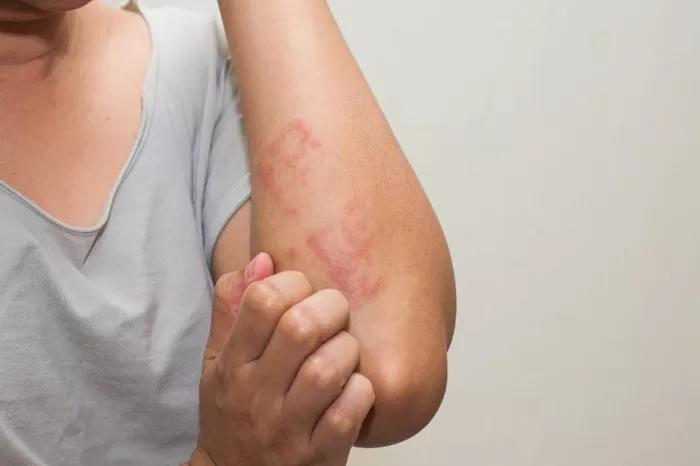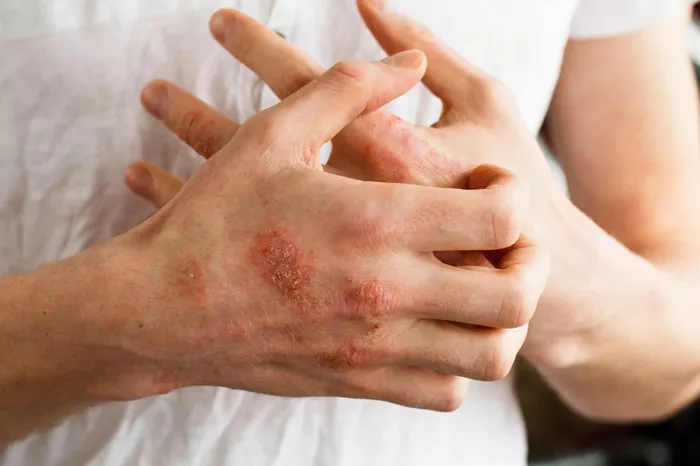Allergic skin rashes can be a source of discomfort, frustration, and concern for many individuals. Whether triggered by environmental allergens, certain foods, or contact with irritants, these rashes vary in duration and severity. In this comprehensive guide, we’ll delve into the intricacies of allergic skin rashes, exploring their diverse nature, typical durations, factors influencing healing time, tips for managing discomfort, and the importance of seeking medical attention when needed.
Explanation of Allergic Skin Rashes and Variable Duration
Allergic skin rashes, also known as allergic dermatitis or allergic eczema, occur when the skin comes into contact with an allergen or irritant, triggering an immune response. This immune response can lead to inflammation, redness, itching, and the formation of rash-like symptoms.
The duration of an allergic skin rash can vary widely depending on several factors, including the type of rash, the severity of the allergic reaction, individual differences in skin sensitivity, and the effectiveness of treatment.
Typical Duration of Different Types of Rashes: Hives, Contact Dermatitis, Eczema
Hives (Urticaria): Hives are raised, red welts that can appear suddenly and often disappear within a few hours or days. However, in some cases, hives may persist for several weeks or months, especially if triggered by chronic underlying conditions such as autoimmune disorders or infections.
Contact Dermatitis: Contact dermatitis occurs when the skin comes into contact with an irritant or allergen, leading to redness, itching, and inflammation. Acute contact dermatitis typically resolves within a few days to weeks after the allergen is removed, while chronic contact dermatitis may persist for weeks or months if exposure continues.
Eczema (Atopic Dermatitis): Eczema is a chronic inflammatory skin condition characterized by dry, itchy, and inflamed patches of skin. While eczema symptoms may fluctuate over time, flare-ups can last anywhere from a few days to several weeks, depending on triggers, treatment effectiveness, and individual factors.
Factors Influencing Healing Time: Allergen Avoidance, Severity, Individual Differences
Several factors can influence the healing time of an allergic skin rash:
Allergen Avoidance: Avoiding exposure to the allergen or irritant responsible for triggering the rash is essential for promoting healing and preventing future flare-ups. Identifying and eliminating potential triggers from your environment, skincare products, and diet can help minimize the duration and severity of allergic reactions.
Severity of Reaction: The severity of the allergic reaction can also impact healing time. Mild reactions may resolve on their own or with over-the-counter treatments within a few days, while more severe reactions may require prescription medications, such as oral antihistamines or corticosteroids, to alleviate symptoms and promote healing.
Individual Differences: Individual differences in skin sensitivity, immune response, and overall health can influence how long an allergic skin rash lasts. Factors such as age, underlying medical conditions, genetic predisposition, and lifestyle habits can all play a role in determining the duration and severity of allergic reactions.
Tips for Managing Discomfort and Promoting Healing
While allergic skin rashes can be uncomfortable and distressing, there are several strategies you can use to manage symptoms and promote healing:
Topical Treatments: Over-the-counter hydrocortisone creams, calamine lotion, or antihistamine creams can help reduce itching, inflammation, and redness associated with allergic skin rashes. Apply as directed and avoid using on broken or irritated skin.
Cool Compresses: Applying cool compresses or taking cool baths can provide relief from itching and inflammation, soothe irritated skin, and promote healing. Avoid hot water, which can exacerbate symptoms and further irritate the skin.
Moisturizing: Keeping the skin well-hydrated with gentle, fragrance-free moisturizers can help soothe dryness, reduce itching, and restore the skin’s natural barrier function. Choose moisturizers specifically formulated for sensitive or eczema-prone skin and apply liberally as needed.
Avoid Scratching: Resist the urge to scratch or pick at the rash, as this can further irritate the skin, increase inflammation, and prolong healing time. Instead, gently pat or tap the skin to relieve itching without causing damage.
Identify and Avoid Triggers: Work with your healthcare provider to identify potential triggers for allergic reactions and take steps to avoid exposure whenever possible. This may involve avoiding certain foods, skincare products, environmental allergens, or clothing materials that exacerbate symptoms.
Importance of Seeking Medical Attention
While many allergic skin rashes can be managed effectively at home with over-the-counter treatments and self-care measures, it’s important to seek medical attention if:
Symptoms Worsen: If symptoms persist, worsen, or spread to other areas of the body despite treatment, consult a healthcare provider for further evaluation and management.
Severe Reactions: Severe allergic reactions, such as difficulty breathing, swelling of the face or throat, or anaphylaxis, require immediate medical attention and may necessitate emergency treatment, including epinephrine injection.
Chronic Rashes: If you experience chronic or recurrent allergic skin rashes, consult a dermatologist or allergist for a comprehensive evaluation, diagnosis, and treatment plan tailored to your specific needs.
Complications: Complications of allergic skin rashes, such as bacterial or fungal infections, scarring, or hyperpigmentation, may require medical intervention to prevent further damage and promote healing.
Conclusion
Allergic skin rashes can be a source of discomfort and frustration, but with proper management and care, most rashes can be effectively treated and resolved. By understanding the factors influencing healing time, implementing self-care strategies to manage symptoms, and seeking medical attention when needed, individuals can minimize the duration and severity of allergic reactions and promote healing. Remember to identify and avoid triggers, adhere to treatment recommendations, and prioritize self-care to support overall skin health and well-being.
[inline_related_posts title=”You Might Be Interested In” title_align=”left” style=”list” number=”6″ align=”none” ids=”6902,6899,6896″ by=”categories” orderby=”rand” order=”DESC” hide_thumb=”no” thumb_right=”no” views=”no” date=”yes” grid_columns=”2″ post_type=”” tax=””]
































